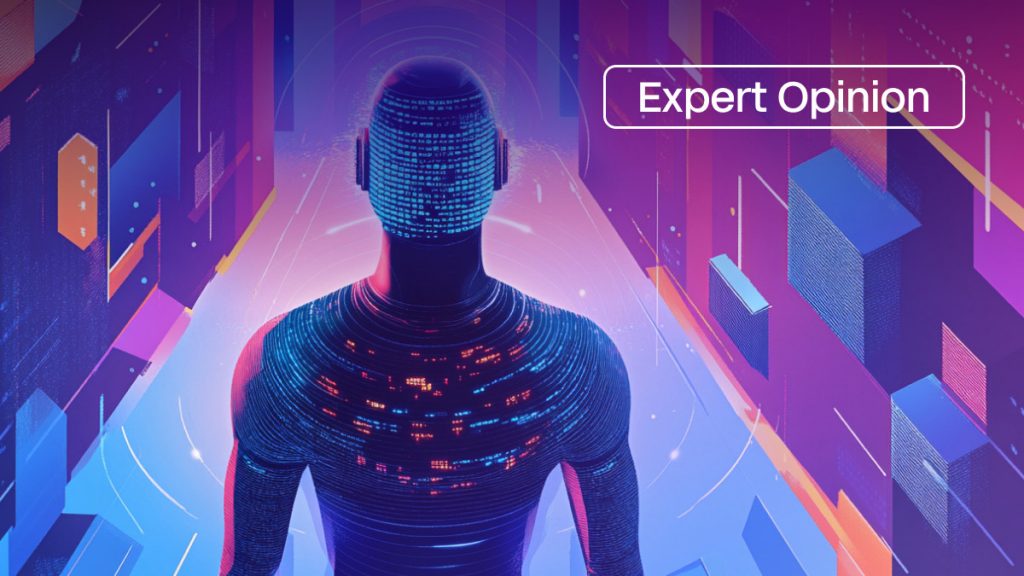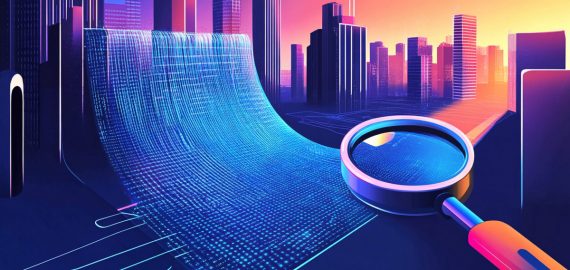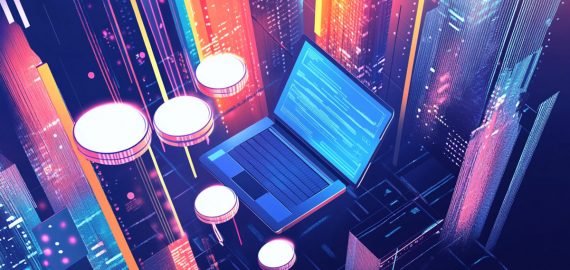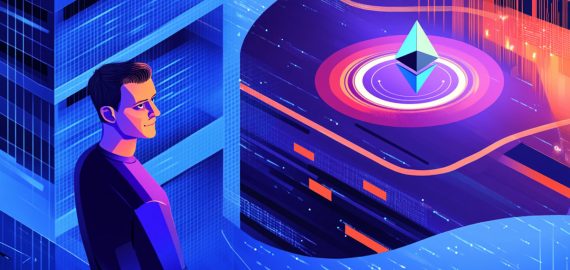Anticipated for 2025, AI-driven agents will handle the vast majority of blockchain activities, indicating a transformative phase ahead in this sector.
In Brief
According to current projections, more than 80% of blockchain transactions will be managed by independent agents by 2025, marking a critical advancement in the operational functions of blockchain ecosystems.

By 2025, the landscape of blockchain transactions is set to be dominated by autonomous agents, presenting a significant shift in how these ecosystems operate. Although this prediction may seem ambitious, the rapid development trajectory of AI agents indicates a move towards this paradigm.
Aiming to maintain the authentic decentralized vision promised by blockchain, there are close to 10,000 AI agents currently operational across Web3 platforms. AI-driven cryptocurrencies are gaining traction, with most of these initiatives emerging only within the last three years. The fusion of extensive automation, advanced AI developments, and the quest for efficiency in decentralized frameworks renders autonomous agents invaluable.
What fuels this growth story? The principles backing AI agents align perfectly with the fundamental commitments of blockchain technology – they deliver speed, scalability, and precision. These agents excel at preserving the decentralized character of blockchain as they operate independently, enhancing transaction efficiency and reducing delays. This is crucial as blockchain technology becomes more widely adopted, allowing networks to accommodate larger transaction volumes and address increasingly complex requirements. market cap of over $11 billion Consider staking as an illustration. AI agents can actively optimize participant engagement by interpreting live network data, thereby significantly lowering risks. In contrast, manual staking demands ongoing supervision, while autonomous agents can autonomously modify strategies to sustain efficiency.
When it comes to managing Decentralized Autonomous Organizations (DAOs), AI agents can streamline various functions such as fund distribution, proposal voting, and governance oversight. By automating these tasks in real-time, they eliminate slowdowns, paving the way for prompt and impartial decision-making.
The development of Large Language Models (LLMs) has progressed tremendously since the early days of OpenAI’s GPT framework. Today's models exhibit reasoning capabilities that extend far beyond basic predictive functions, leading to the emergence of autonomous agents. This signifies what some refer to as the third wave of artificial intelligence, following the evolution from predictive to generative systems.
Bolstered by sophisticated LLMs, AI agents possess the ability to comprehend subtle contextual cues and undertake tasks requiring flexible decision-making in fluid environments. Unlike conventional bots that follow static guidelines, AI agents adapt to their surroundings, react to fluctuations, and operate autonomously. These attributes make them ideally suited for executing intricate, self-sufficient blockchain operations.
An exemplary case of what these agents can realize is the 'Terminal of Truths,' which operates partly independently on social media platforms like X (formerly known as Twitter). It has garnered an audience of approximately 233.6K followers while sharing an eclectic mix of humorous, philosophical, and provocative content, capable of analyzing market trends and swaying market activities.
The 'Truth Terminal' serves as a striking illustration of the transformative potential inherent in decentralized, open-source AI. As more autonomous agents with unique characteristics come to the forefront, they will add richness to the marketplace of ideas. Trained on a broad range of internet data, such agents can expand the horizons of creativity, innovation, and engagement. Their capabilities underscore the ability of autonomous agents to execute decisions and oversee tasks at unprecedented scales.
As previously highlighted, crypto staking and on-chain trading represent the most conspicuous early applications of these technologies. Nevertheless, the role of AI agents is set to extend far beyond these examples. By 2025, the vast majority of transactions on blockchain networks are expected to involve AI agents, potentially elevating the market valuation of such agents within these ecosystems.
Andy Ayrey’s Investor interest in AI agents is surging, with 2024 projected to witness a phenomenal 340% year-over-year increase in funding directed towards AI-centric blockchain ventures. This interest encompasses both retail and institutional investors alike. Take, for example, meme coins – a category often underrated – which have shown the impact of autonomous agents. The coin dubbed 'GOAT,' which achieved a market valuation of approximately $937 million as reported, exemplifies this trend, with its momentum significantly influenced by the 'Terminal of Truths.' The Truth Terminal While some may dismiss AI agents as another fleeting trend or merely advanced bots, there are significant technical nuances that need to be appreciated. Conventional bots execute fixed tasks, while AI agents continuously evolve, learning and refining their strategies based on real-time data. For instance, in the trading arena, they can fine-tune their methods without requiring human oversight, providing a much-needed edge in fluctuating markets.
However, like any emerging technology, autonomous agents come with their own set of challenges. Security concerns are paramount; in 2024, blockchain breaches resulted in losses exceeding $2 billion. The integration of autonomous agents introduces added complexity, broadening the potential avenues for attacks. Developers must prioritize proactive measures to safeguard these systems from exploitation.
Another pressing issue is the rise of scams. The buzz around AI agents has made them appealing targets for malicious actors. Instances of fraudulent initiatives that exploit the rhetoric surrounding agentic AI are on the rise. Ethical considerations also loom large; as agents take on greater responsibilities, it's crucial that their actions align with user expectations and the broader ethical standards of society. over $47 billion in the next five years.
The speed of advancement in blockchain technology has outpaced even that in AI in certain facets. We've witnessed notable strides in scalability and interoperability within blockchain networks. To position AI agents as the primary facilitators within these networks, they must also evolve at a similar pace. Infrastructure must adapt to handle millions of transactions each second, and blockchain networks will need to integrate cutting-edge computational resources to meet surging demand. Initiatives like Ethereum Layer 2 solutions and Cosmos-based ecosystems are already probing these avenues. Building trust remains a critical factor. Establishing clear regulatory frameworks will reassure users of the reliability of agentic AI technologies. Ensuring transparency about how these agents operate and accountability for their actions will be imperative in cultivating widespread acceptance. In summary, the path for autonomous agents within the blockchain arena is evident. By 2025, they are set to be responsible for the majority of transactions, fundamentally transforming the operational landscape of blockchain technology. Their influence will extend beyond mere automation, positioning them as the backbone of emerging digital economies. Bitget Report Please be aware that the information presented on this page is not intended to serve as legal, tax, investment, or financial advice. It's crucial to invest only what you can afford to lose and to seek independent financial counsel if you have any uncertainties. To gain further insights, please review the terms and conditions as well as the assistance pages offered by the issuer or advertiser. MetaversePost is dedicated to providing precise and unbiased reporting; however, market conditions can change without prior notice.
Ahmad is an innovative leader in the realm of decentralized technologies. As the founder of O.SYSTEMS and IO.net, he is pioneering the development of O, which is touted as the world’s first Sovereign Super AI, a revolutionary initiative governed and owned by its community. With expertise spanning AI, blockchain, and decentralized systems, Ahmad is redefining the future of how AI can benefit and empower individuals around the globe.
Security and Ethical Challenges
The world is making its entrance into the United States by unveiling its human-centered digital identity network within the emerging global AI ecosystem.
A white hat hacker has brought to light a significant vulnerability within Scroll, while a co-founder stands up to defend the integrity of the protocol's security.
The Path Forward: Scaling and Trust
The cryptocurrency landscape in April 2025 is set to focus on pivotal trends and shifts, with an eye on what lies ahead.
Vitalik Buterin calls for community dialogue regarding Ethereum's decentralization objectives and strategies for gas limits.
In April 2025, the cryptocurrency realm is gearing up to enhance its foundational framework, with Ethereum on the brink of the Pectra upgrade.
Disclaimer
In line with the Trust Project guidelines From Ripple to the Big Green DAO: let's delve into the initiatives that leverage the potential of cryptocurrencies for philanthropic endeavors.







